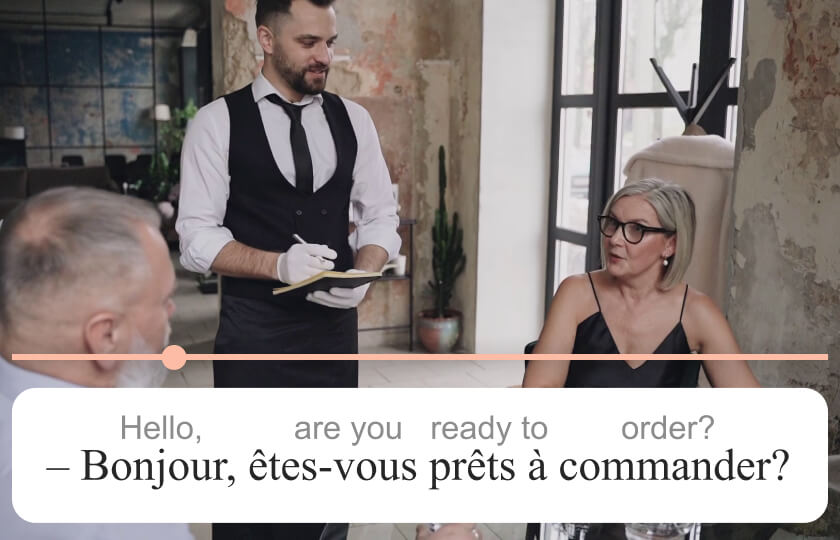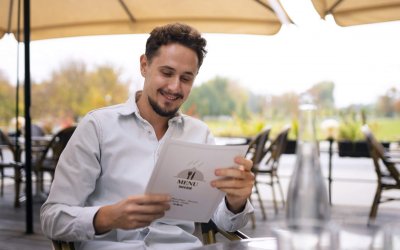Planning a trip to France? Whether you’ll be wandering through Parisian streets, exploring cozy village markets, or ordering a croissant in a café, knowing a few key French phrases can make all the difference. Learn these essential travel phrases to make your trip smoother and a whole lot more fun!”
Hello and goodbye (bonjour / au revoir)
Want to make a great first impression in France? Start with “hello” and “goodbye”. These simple words can work wonders.
Hello
Here are the most common ways to greet somebody in French:
Add “madame“, “monsieur“, or “mademoiselle“ to be extra polite.
Goodbye
When it’s time to leave, “au revoir” is your best bet. Here are more options:
| Phrase | Use Case |
|---|---|
| Au revoir Goodbye | Works everywhere |
| Salut Bye | For friends |
| À bientôt See you soon | Slightly casual |
| Bonne journée Have a nice day | Leaving shops or ending chats |
Tip: Always start with “Bonjour“ when you enter a shop or restaurant.
Please and thank you (s’il vous plaît / merci)
Want to win over the French? Master “please” and “thank you”.
Please
“S’il vous plaît“ is French for “please”. Here’s how to use it:
- Formal situations: “S’il vous plaît“
- Chatting with friends: “S’il te plaît“
- Tack it onto questions: “Où est la gare, s’il vous plaît?“ (Where’s the train station, please?)
Thank you
“Merci“ means “thank you”, but it’s got range:
| Phrase | Use Case |
|---|---|
| Merci Thank you | Everyday situations |
| Merci beaucoup Thank you very much | Extra grateful |
| Merci mille fois Thanks a million | Someone saved your life |
| Je vous remercie I thank you | Formal settings |
Someone says “merci“? Hit ’em back with “de rien“ (you’re welcome).
Do you speak English? (Parlez-vous anglais?)
Stuck in France with no French skills? No worries. This magic phrase will save you:
“Parlez-vous anglais?“ (Do you speak English?)
Here’s how to use it without looking like a total tourist:
- Start with “Bonjour.“ Skip it, and you’re already off on the wrong foot.
- Then hit ’em with “Parlez-vous anglais?“
- Brace yourself. Not everyone in France speaks English, especially if you’re off the beaten path.
But wait, there’s more!
When you’re clueless, say:
- Je ne parle pas français (I don’t speak French)
When you’re trying:
- Je parle un peu français (I speak a little French)
When they’re too fast:
- Parlez lentement, s’il vous plaît (Speak slowly, please)
Quick Tip: Talking to someone older or in a fancy place? Stick with “Parlez-vous anglais?“ For your new French buddy at the bar? “Parles-tu anglais?“ works just fine.
Where Is…? (Où Est…?)
Got lost? Don’t sweat it. “Où est…?“ (Where is…?) is your ticket to finding your way around.
For single locations, use “Où est…?“. For multiple spots, go with “Où sont…?“.
Here are some more variations:
| Phrase | Use Case |
|---|---|
| Où se trouve…? Where is…located? | Formal situations |
| Où puis-je trouver…? Where can I find…? | Looking for services |
| Y a-t-il…près d’ici? Is there…near here? | Searching nearby |
Tip: Start with “Excusez-moi“ (Excuse me) before asking.
Let’s see it in action:
- “Où est la Tour Eiffel?“ (Where’s the Eiffel Tower?)
- “Où sont les toilettes?“ (Where are the restrooms?)
- “Où puis-je trouver une pharmacie?“ (Where can I find a pharmacy?)
Once you’ve asked, you’ll need to understand the answer. Here’s a quick guide:
- À droite (Right)
- À gauche (Left)
- Tout droit (Straight ahead)
- Au coin (On the corner)
With these phrases, you’ll navigate French streets like a local. Just remember to say “Merci beaucoup!” after getting directions!
I would like… (je voudrais…)
Want to order something? “Je voudrais” (I would like) is the way to go. It’s polite, versatile, and perfect for restaurants, cafes, and shops.
Here’s the formula:
“Je voudrais” + what you want + “s’il vous plaît“.
Let’s see it in action:
| Where | What to Say |
|---|---|
| Restaurant | Je voudrais une soupe au potiron, s’il vous plaît. I would like a pumpkin soup, please. |
| Train station | Je voudrais un billet pour Paris, s’il vous plaît. I would like a ticket to Paris, please. |
| Shop | Je voudrais cela, s’il vous plaît. I would like this one, please. |
| Bar | Je voudrais un verre de vin, s’il vous plaît. I would like a glass of wine, please. |
Not ready to order? No sweat. Try these:
- “Je n’ai pas choisi.” (I haven’t chosen.)
- “Une minute encore, s’il vous plaît.” (One more minute, please.)
- “Qu’est-ce que vous recommandez?” (What would you recommend?)
Got food restrictions? Here’s how to say it:
- “Je suis végétarien(ne).” (I’m vegetarian.)
- “Je suis végétalien(ne).” (I’m vegan.)
- “Je suis allergique à…” (I’m allergic to…)
Bonus Tip: Want to sound even more local? Try “Je prendrai” (I’ll have) or “Je vais prendre” (I’m going to have). For example: “Je prendrai un croissant, s’il vous plaît.” (I’ll have a croissant, please.)
Excuse me (excusez-moi)
“Excusez-moi” is your Swiss Army knife of French phrases. It’s how you get attention, apologize, or squeeze through a crowd in France.
| Situation | Phrase |
|---|---|
| Getting attention | Excusez-moi, monsieur Excuse me, sir |
| Apologizing | Excusez-moi, je suis désolé Excuse me, I’m sorry |
| Passing through a crowd | Excusez-moi, je peux passer? Excuse me, can I get through? |
| Asking for help | Excusez-moi de vous déranger Excuse me for disturbing you |
In a rush? “Pardon” is your quick fix. It’s perfect for navigating the busy Parisian metro.
Need to up the politeness? “Pardonnez-moi” is your fancy option. Use it like this:
“Pardonnez-moi, ce train va-t-il à Montpellier?” (Pardon me, does this train go to Montpellier?)
The bill, please (L’addition, s’il vous plaît)
You’ve just finished a great meal. Now what? It’s time to ask for the bill.
Here’s your go-to phrase: “L’addition, s’il vous plaît” (The bill, please).
Here are other options:
- Je peux avoir l’addition? (More casual, like “Can I get the check?”)
- On pourrait avoir la note? (A bit fancier, “Could we have the bill?”)
Tip: French waiters won’t rush you out. They’ll only bring the bill when you ask. So don’t just sit there – speak up!
Dining with friends? No sweat. To split the bill, say:
- “On va diviser par quatre s’il vous plaît.” (We’ll split it four ways, please)
Now, here’s a shocker: You don’t have to tip in France. Service is usually baked into the price. But if the service was great, a small tip (5-10%) is a nice gesture.
When you get your bill, the waiter might ask, “Ça a été?” (How was everything?). A simple “Oui, c’était très bon, merci” (Yes, it was very good, thanks) works perfectly.
One last thing: Don’t freak out if people hang around after paying. In France, it’s totally fine to chill at your table post-bill. No need to bolt!
I don’t understand (Je ne comprends pas)
Lost in translation? Just say: “Je ne comprends pas” (I don’t understand).
Want to sound extra polite? Just add “Excusez-moi” (Excuse me) before this phrase.
Stuck in a conversation? Try these:
- Point to a map or show a picture on your phone. Sometimes, a picture really is worth a thousand words.
- Keep a phrasebook handy or use a translation app. Quick access to key phrases can be a game-changer.
- If someone’s talking too fast, ask them to slow down:
“Pourriez-vous répéter plus lentement s’il vous plaît?” (Could you repeat more slowly please?)
And if you’re feeling brave? Try the informal “Je pige pas” (I don’t get it) with new French friends. Just don’t use it in formal situations!
Related video
Tips to practice your French
Use language learning apps
Aim for 10-15 minutes a day. Consistency is key!
Practice common scenarios
For instance, roleplay ordering meals. Use phrases like:
- “Je voudrais…” (I would like…)
- “Qu’est-ce que vous recommandez?” (What do you recommend?)
- “L’addition, s’il vous plaît” (The bill, please)
Create a French-only hour
Set aside an hour each day for French only. During this time:
- Think in French
- Talk to yourself in French
- Write notes or journal in French
Dive into French media
- Watch French movies and shows (with French subtitles) on Netflix
- Listen to French music and podcasts during your commute
- Read French books, newspapers, or online articles
This helps you pick up vocab, pronunciation, and cultural tidbits without even trying.
Join language exchanges
Hit up local language meetups or find an online chat buddy. Talking with native French speakers boosts your skills and confidence. Check out Tandem or HelloTalk to find language partners.
Keep a French notebook
Carry a small notebook and jot down new words, phrases, or things you can’t name in French. It’s like creating your own personal French dictionary.
Switch your devices to French
Change your phone, tablet, or computer language to French. It’s an easy way to learn tech vocab and reinforce learning through repetition.
Try shadowing
Listen to French audio and repeat what you hear, mimicking the speaker’s tone and pronunciation. It’s great for improving your accent and speaking flow.
Embrace mistakes
Don’t sweat the errors – they’re just stepping stones to fluency. Keep at it, and soon you’ll be chatting away in France with confidence!
Conclusion
Be patient. Learning a language takes time. Celebrate the small wins, like ordering a coffee without stumbling.
Speaking even a little French shows respect. It can lead to better experiences and friendlier locals during your trip.
So, ready to put these phrases to use? Bon voyage et bonne chance!

